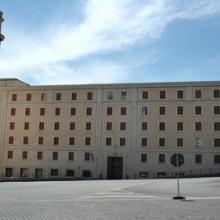vow of poverty
Paul said, "the foolishness of the cross" not "the stable middle-class lifestyle," if you want my opinion on seminary education, the changing economy, and baptismal identity in general. We bear a responsibility to care for one another as Christians (and beyond) that we have abdicated to the persnickety "marketplace." It's time to talk about holy poverty again, I think.
I can hear my free church friends and colleagues now, "But we don't take a vow of poverty!" It's true. We don't. We remember this historical movement away from the monasteries and the cathedrals, the parish system and the state church. This is an issue of ecclesiology, no question. What I wonder, however, is if in our attempts to not fall into the traps of the past, we simply have settled on the marketplace as our model for ecclesiology. I assume we have.
My degree is a "professional degree," yet within its conceptual framework the notion that I am "professed" is easily lost. I am not called to earn, but to labor, to serve. My work is "worth" nothing. Instead, it is a response to a vocation that in many ways we all share. The wealth of the community affords me the opportunity to respond to that shared call in a particular way. I am not your employee. I am your pastor. I am poor. Any wealth I may posses comes directly from the pockets of others.
VATICAN CITY — Shunning the spacious papal apartment used by his predecessors, Pope Francis has chosen to continue living in the Vatican guesthouse where he has been staying since the beginning of the conclave.
The Vatican’s chief spokesman, the Rev. Federico Lombardi, explained on Tuesday that Francis will live “until further notice” in a suite in the Santa Martha Residence, a modern Vatican guesthouse for priests and bishops who work in the Roman Curia or who are visiting the Vatican for meetings and conferences.
Francis made his intentions clear on Tuesday morning, while celebrating Mass in the residence’s chapel for its permanent guests, who occupy about half of the residence’s 130 or so rooms.
The pontiff’s choice is a consequence of his desire to adopt a “simple” living arrangement that allows him “to live in community” with other priests and bishops, Lombardi explained.
For the first time in six centuries, the head of the Catholic Church is stepping down. Some, like Huffington Post Religion’s Senior Editor Paul Raushenbush, have suggested this is an indication that the stodgy religious institution is creeping its way toward modernism. Could it be that the role of Pope will be considered to be that more like a CEO than a sovereign ruler? Is there room within today’s church for its leadership to step down when they feel they can no longer adequately fill the tremendous demands heaped upon them?
Can Popes retire? And if so, do they have to give up those cool red shoes?
So if, indeed, the Catholic Church is moving in a new direction, why not consider a more thorough overhaul? Some have suggested that the next Pope should come from the southern hemisphere, given that this is where the faith is growing the most (actually, it’s not really growing much at all in the northern half of the world). But as some have suggested within the church, the process of selecting a Pope is not necessarily driven by creating a representative leadership.
That said, it seems a rare opportunity to do something exciting. I, like many people, assumed that the successor to Pope Benedict would have to come from within the College of Cardinals. But though this has been tradition for most of the life of the Church, Pope Clement V is a rare exception. He was plucked from a monastery to become Pope, with the hope of overcoming much of the perceived corruption within the College.
And though the College of Cardinals is not explicitly mired in scandal at the moment, the Church itself certainly has suffered some blows in the court of public opinion, as well as in the court of law, in some cases. So given that precedent, perhaps it’s time for another radical departure from tradition, one that will signal to the world that the Church is more committed than ever before to its mandate to care for the poor, and support the marginalized.


